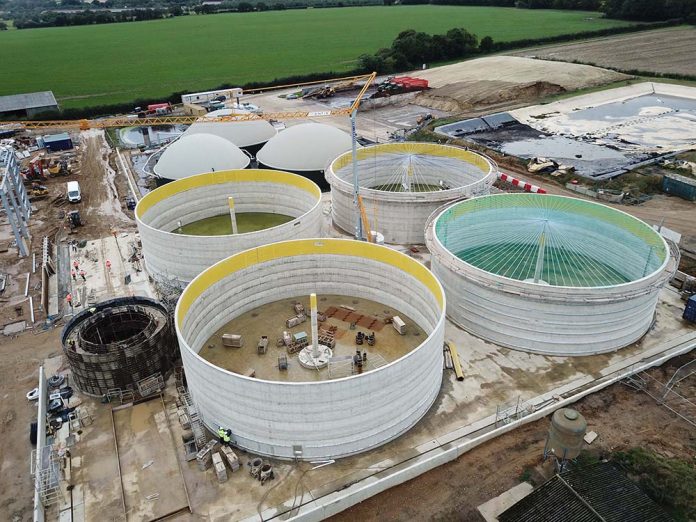Locally collected food waste, coupled with an upgraded anaerobic digestion plant, is creating a sustainable energy solution for businesses and homes in the Norfolk town of Attleborough.
Construction work at a Norfolk-based anaerobic digestion (AD) plant will provide households in the south-east town of Attleborough with 10MW of biomethane per hour – enough to supply 4,000 homes, and guarantee green gas for most of the year.
Marc Graham is project development manager at Privilege Finance, which specialises in projects that reduce carbon emissions. He is leading the development, and explained that the AD process breaks down organic materials such as food waste, crops and animal waste, in the absence of oxygen, to produce biogas and digestate.
Marc said: “Biogas is a renewable source of energy, while the digestate can be used as a biofertiliser on farmland.
“Processing food waste using AD contributes towards a circular economy, by creating energy from waste. The technology has been recognised by the government as a key contributor to reaching net zero targets, by helping to decarbonise the heating sector, while producing a sustainable source of energy.”
The project
The Attleborough site is already home to an AD plant which uses agricultural waste and feedstock crops to generate electricity. Mr Graham explains that the upgrade project will allow a broader range of feedstocks to be processed.
“The developments at the plant include four new digestion tanks, a food waste reception hall and a depackaging unit, to allow packaged food waste to be accepted.”
The plant will also see the addition of a gas upgrader to remove CO2 from generated biogas to produce biomethane. This system enables gas to be pumped into the town.
Marc added: “The project will use local food waste to produce biomethane gas, using waste which would otherwise be going to landfill or transported out of the county for processing.
“The digestate biofertiliser will be used by local farms to improve soil quality and add nutrients.”
The £17m upgrade is set to be completed in May 2022, with gas expected to start being piped directly into Attleborough town two months later. The existing AD plant will remain fully operational, providing electricity to the national grid and powering the entire site.
What does this mean for the people of Attleborough?
Once the new AD tanks are fully operational, the biomethane produced will supply 4,000 Attleborough homes and businesses with green gas all year.
Mr Graham pointed out that, in the UK, household gas supplied by the gas grid is typically derived from various sources, so there is no guarantee that the gas powering a home boiler is actually from a renewable source, even if you are paying for a renewable gas contract.
“By exclusively piping gas from the AD plant into the town, Attleborough locals can be sure that their homes and businesses are being provided with locally generated renewable energy,” he said.
“Despite this huge change to the gas supply, homeowners will not notice any difference during the transition to green gas, as the biomethane molecule is identical to that of natural gas, its fossil fuel equivalent,” he adds.
“The plant is designed to have the capability to process both commercial and domestic food waste into energy but can also utilise agricultural waste. That capability allows flexibility in the sense that there will always be organic waste to process, and so a reliable energy source for the town.
“The development works are a really exciting opportunity for the town of Attleborough and it demonstrates how a sustainable approach to supplying gas can be implemented in local towns. Hopefully, we will see projects like this replicated across the country in subsequent years.”
A waste management solution
The expansion of the plant will provide Norfolk businesses and residents with a local food waste facility which has the capacity to process 100,000 tonnes of waste per annum. Local residents and businesses can sustainably dispose of their food waste, with minimal carbon emissions from road transport, while helping the environment by reducing methane emissions.
This timely expansion ties in well with the legislation changes coming into force in 2023, regarding the compulsory requirement of separate food waste collection in England.
Marc continued: “Local food waste collection not only provides feedstock for the AD plant, but also reduces transportation and haulage requirements, again contributing to reducing overall carbon emissions, providing a sustainable approach to energy generation and reducing disposal costs to businesses and councils.
“The UK alone produces around 9.5 million tonnes of food waste annually, and globally food waste contributes to between 6-8% of carbon emissions every year. That’s why utilising food waste and generating sustainable energy is crucial for decarbonising our planet.”
Privilege Finance specialise in funding projects which reduce carbon and mitigate against climate change. Their work has seen over one million UK households being powered by green energy. “The project at Attleborough is especially exciting for us to develop and fund, as the upgrades are enabling a true circular economy approach,” Marc concluded.





